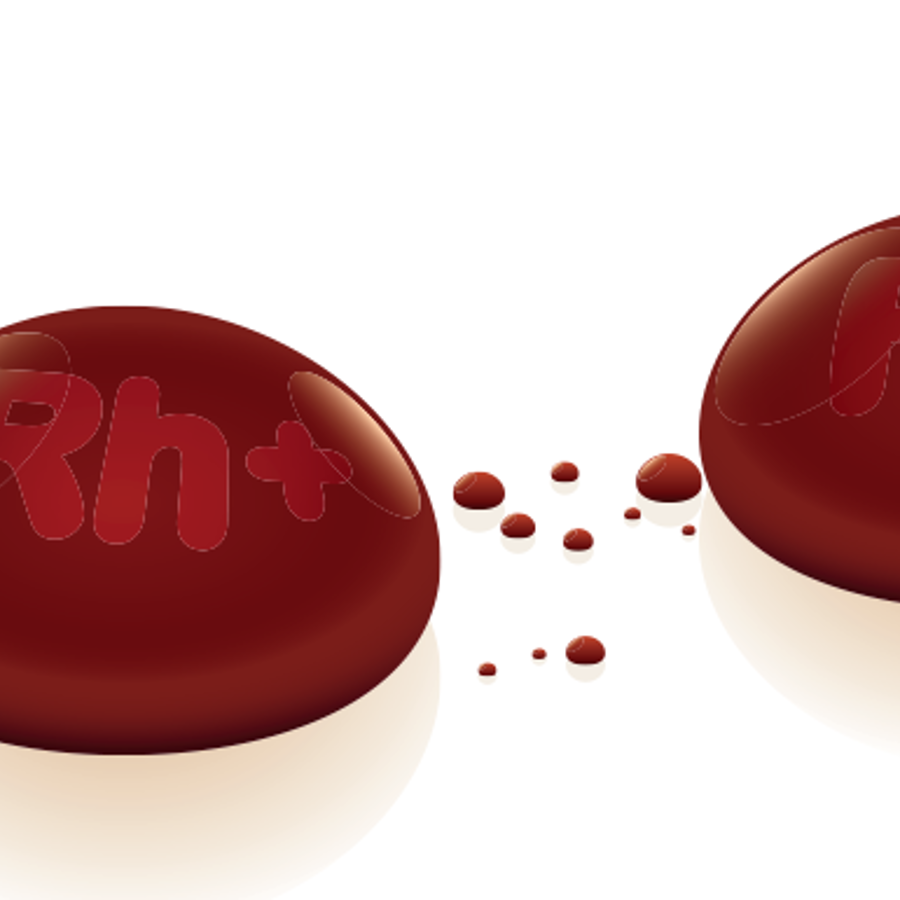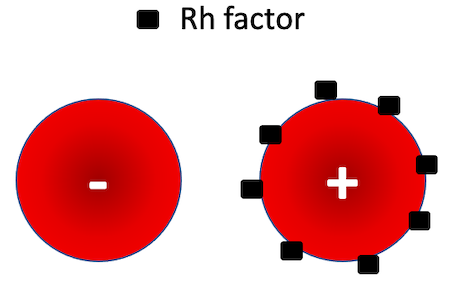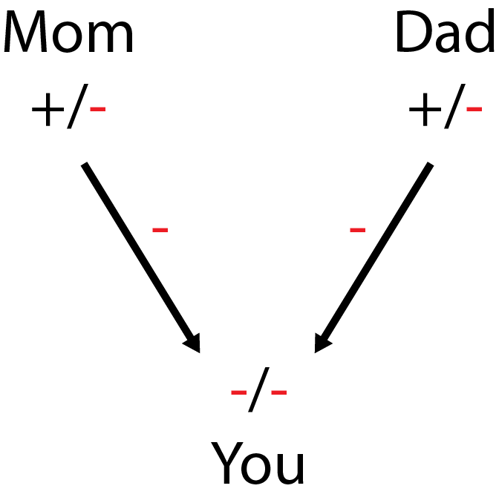
How do I have Rh negative-type blood, when both my parents are positive?
November 3, 2006

- Related Topics:
- Blood type,
- Rh factor,
- Carrier
A curious adult from California asks:
"I have the A Negative (A-) blood type. My mother has the A Positive (A+) blood type, and my father has the O Positive (O+) blood type. So, how can I have the A- blood type if both of my parents are + blood type? Could I have gotten my blood type from one of my grandparents?"
Phew! Lots of good questions here! We won't deal with the A and O parts of your blood type. Click here to understand why you got your mom's A blood type and not your dad's O (although either was possible).
So, how did you end up with a negative blood type when your folks were positive? Most likely because your parents are carriers for the negative blood type.
Let's use blood type to explain what a carrier is. Remember, we all have 2 copies of most of our genes, one from mom and one from dad. And our genes come in different versions.
For example, there is a gene called RHD that comes in at least two versions. One version is called positive and the other negative. Together these versions lead to the Rh+ and Rh- that is reported in blood type.
Now, it is obvious what happens if we have two RHD+ versions, we have Rh+ (or "+") blood. And if we have two RHD- versions, we have Rh- (or "-") blood. But what happens if you have one of each?
You are Rh+ but a carrier for Rh- blood. Here's why this is.
Remember, genes are just recipes for making proteins. And proteins do all the work in a cell. They carry our oxygen, help us to see, provide support for our cells, etc.
The RHD gene makes the RHD protein. We don't know what this protein does but it sits on the outside of our red blood cells. And we know we can live without it because some people do not make any RHD protein.
These people are Rh-. The RHD+ (or "+") version of the gene contains a complete set of the instructions to make the RHD protein. RHD- (or "-") versions are either missing some of the instructions or have them scrambled up.
So Rh- people make no RHD protein because both versions of their RHD gene don't work. As you might have guessed, Rh+ people need just one working RHD gene.

This is because people with just one working copy of the RHD gene make enough RHD protein to be Rh+. But they still have an RH- version they can pass on to their kids. This is what a carrier is. And most likely what your parents are.
Like nearly everyone else, you have two copies of RHD -- one from your mom and one from your dad. So, to end up Rh-, BOTH of your Rh+ parents have to be CARRIERS for the Rh- version of the RHD gene. They had one copy of the RH+ version and one copy of the RH- version.
Mom had a 50-50 shot of passing her Rh- down to you. Your dad had the same chance. So you had a 1 in 4 chance of ending up Rh-. You beat the odds!

Now what about your grandparents? Can we figure out their Rh status from what we know of you and your parents?
Well, there are lots of possibilities so we can't tell for sure. But we DO know that both sets of your grandparents most likely had to have at least one 'scrambled' version of the RHD gene. In other words, at least one grandparent from dad's side of the family was a carrier. And one from mom's side too.
This is the easiest and by far the most common way for your parents to have each inherited an RHD- gene. Now as I said, there are lots of possibilities here.
Your grandparents could have been carriers or maybe one was Rh-. The only possibility that would be harder to explain is if both grandparents were Rh-. This does happen but is rare.
If there were no Rh- grandparents, then as I said, at least one grandparent on each side needs to be a carrier. This is one of the ways that scrambled (or recessive) versions of a gene can remain hidden in a family tree, waiting for a chance to pair up with another recessive version -- so they can be seen.
This is why red hair or blue eyes can seemingly pop up out of nowhere, too. Just like you, these folks with red hair or blue eyes had parents who were carriers for a recessive trait.
Your parents were carriers for the Rh- blood type. Just like other peoples' parents were carriers for red hair or blue eyes.

Author: Dr. David Skibbe
When this answer was published in 2006, David was a postdoctoral fellow in the Department of Biology, studying maize molecular genetics in Virginia Walbot’s laboratory. David wrote this answer while participating in the Stanford at The Tech program.
 Skip Navigation
Skip Navigation
